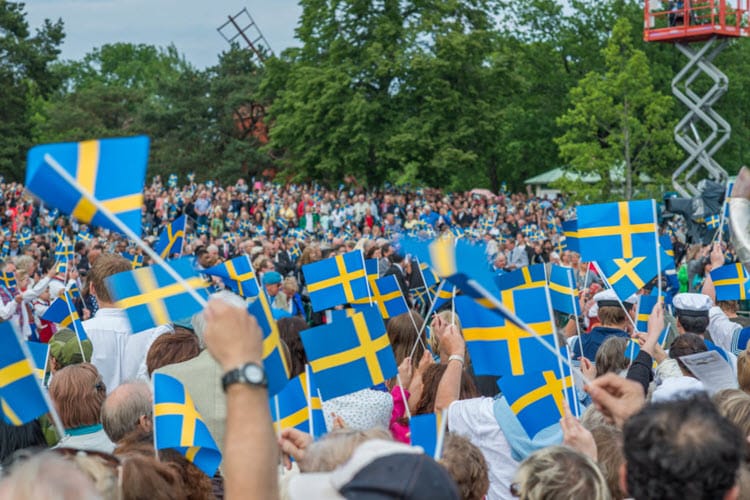Sweden National Day: History, Theme, and Significance

Sweden National Day, also known as Swedish Flag Day, is celebrated annually on June 6th. It is a day of great significance for the Swedish people, commemorating historical events and symbolizing national unity.
History of Sweden National Day
Sweden National Day, also known as Swedish Flag Day, commemorates important historical events that led to the establishment of Sweden as an independent nation. Here is a brief history of Sweden National Day: In the early 16th century, Sweden was part of the Kalmar Union, a political union with Denmark and Norway. The union had centralized power in the Danish monarchy, and Sweden desired greater autonomy and self-governance. On June 6, 1523, Gustav Eriksson Vasa, also known as Gustav I, was elected as King of Sweden in Strängnäs. This event marked the end of the Kalmar Union and the beginning of Sweden’s independence from Danish rule. Gustav Vasa embarked on reforms and laid the foundation for the modern Swedish state. The idea of celebrating Sweden’s national identity and heritage gained momentum in the 19th century during a period of cultural revival. Swedish writers, artists, and intellectuals emphasized the importance of national symbols and traditions.
Sweden began to celebrate June 6th as Gustav Vasa Day, honoring the historical significance of Gustav Vasa’s election as king. However, it was not recognized as a national holiday at this time. In 1983, June 6th was officially designated as “Swedish Flag Day” (Svenska flaggans dag) to celebrate the national flag. The Swedish flag, a symbol of national unity, became the focal point of the celebrations. On January 1, 2005, Sweden National Day officially became a national holiday. The Swedish Parliament passed a law designating June 6th as a public holiday, allowing citizens to celebrate the country’s heritage, culture, and values.
Sweden National Day is now celebrated annually on June 6th throughout the country. It is an occasion for Swedes to display their national flag, participate in cultural events, attend parades, enjoy traditional Swedish food, and engage in various festivities. The royal family also takes part in the celebrations, joining the public in Stockholm for official ceremonies. Sweden National Day holds significance in promoting national unity, democratic values, cultural diversity, and pride in Swedish history. It is a day to reflect on the nation’s journey towards independence and appreciate the shared values that define Sweden as a nation.
Significance of Sweden National Day
Sweden National Day is an occasion for Swedes to express their national pride, celebrate their cultural heritage, and promote a sense of unity and community. The historical background of Gustav Vasa’s election symbolizes Sweden’s transition to a democratic society and its independence from foreign rule. Sweden National Day also celebrates the multicultural aspect of the country, promoting inclusivity and diversity among the Swedish population.
Events at Sweden National Day
Here are some common events that take place on Sweden’s National Day:
- Flag-Raising Ceremonies: Flag-raising ceremonies are held across Sweden, with the national flag, known as the Swedish flag or “Sveriges flagga,” being hoisted on public buildings, private homes, and street poles. These ceremonies symbolize national pride and unity.
- Parades: Colorful parades featuring marching bands, local organizations, schools, and community groups are organized in cities and towns across the country. Participants often dress in traditional Swedish costumes, and the parades create a festive atmosphere.
- Concerts and Performances: Musical concerts and performances take place in parks, squares, and cultural venues. Artists, both professional and amateur, showcase traditional Swedish music, folk dances, and other cultural performances.
- Speeches and Official Ceremonies: Official ceremonies are held, usually in the presence of the royal family and government officials. Speeches are delivered, highlighting the significance of Sweden National Day, promoting national unity, and emphasizing shared values.
- Family Activities: Families come together to celebrate Sweden National Day by organizing picnics, outdoor activities, and games in parks or gardens. It is a day for families to spend quality time together and enjoy the holiday spirit.
- Open-Air Markets: Open-air markets and fairs are set up, featuring local artisans, crafts, traditional Swedish food, and beverages. These markets provide an opportunity to indulge in Swedish delicacies and purchase unique handmade items.
- Cultural Exhibitions: Museums, art galleries, and cultural institutions often hold special exhibitions or events showcasing Swedish history, traditions, and cultural heritage. Visitors can explore exhibits, learn about Swedish customs, and appreciate the country’s rich artistic and cultural contributions.
- Sports Events: Various sports events, tournaments, and competitions are organized to engage the community in healthy physical activities. These events promote camaraderie and sportsmanship among participants and spectators.
It’s important to note that specific events and their scale may vary from one city or region to another. Local communities often organize their own unique celebrations, reflecting regional traditions and cultural diversity while aligning with the broader theme of national unity on Sweden National Day.
Observer Voice is the one stop site for National, International news, Sports, Editor’s Choice, Art/culture contents, Quotes and much more. We also cover historical contents. Historical contents includes World History, Indian History, and what happened today. The website also covers Entertainment across the India and World.

